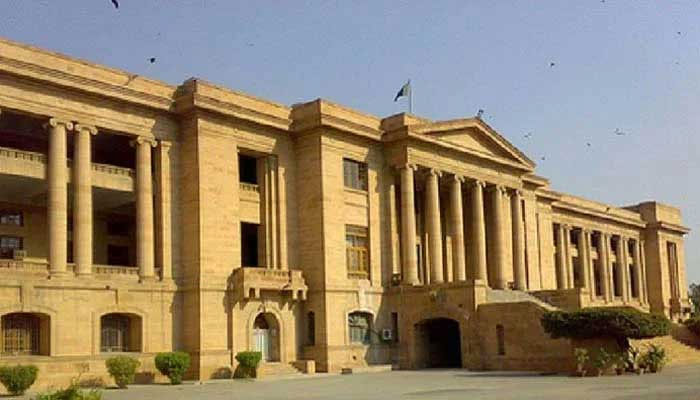SHC dismisses pleas against tax on foreign assets
The SHC dismissed identical petitions that challenged imposition of tax in respect of foreign assets of a resident individual, including moveable and immovable properties
KARACHI: The Sindh High Court on Friday dismissed identical petitions that challenged imposition of tax in respect of foreign assets of a resident individual, including moveable and immovable properties.
The petitioners have assailed the vires of the section 8 (2) (b) of the Finance Act 2022, whereby a tax has been levied on the value of assets for tax year 2022 and onwards in respect of foreign assets of a resident individual which includes moveable and immoveable properties.
The petitioners’ counsel submitted that the parliament is not competent to levy the impugned tax on immovable properties located abroad and the powers of the parliament pursuant to 18th amendment to the Constitution are now curtailed in respect of levying any tax on immovable properties.
They submitted that the imposition of tax on foreign assets was not within the competence of the parliament as it cannot even legislate in respect of properties outside the territorial limits of Pakistan.
The federal government and the FBR counsel submitted that the petitioners have availed amnesty under the Foreign Assets Act, which was also legislated by the parliament in respect of immoveable properties. Therefore, the petitioners cannot object as to the competence of the parliament that the capital value of a property located abroad can be taxed by the parliament pursuant to Articles 141 and 142 read with Article 97 of the Constitution.
They submitted that the federal government can levy such tax as provinces cannot legislate in respect of immovable properties located abroad.
The SHC’s division bench headed by Justice Mohammad Junaid Ghaffar, after hearing the arguments of the counsel, observed that the concept of taxation in respect of foreign income is now a worldwide phenomenon and majority of the countries have incorporated the provisions relating to taxing incomes of resident persons.
The court observed that admittedly, the foreign income is not earned within the territorial jurisdiction of Pakistan but in terms of constitutional provisions which empower the parliament to levy taxes on income of a resident person as his income abroad is also taxed and such tax has never been disputed before the court.
The court observed that the petitioners as well as other taxpayers availed amnesty under Foreign Assets (Declaration and Repatriation) Act, 2018, and after paying requisite tax, they declared these properties under their Wealth Tax Returns.
The court observed that these assets are now part of the Wealth Tax Returns of the resident taxpayers, therefore, even otherwise there is a nexus of these properties with the income and wealth of the resident taxpayers and there appears to be no impediment for the parliament to levy the tax in question.
The court observed
that the petitioners’ counsel did not raise substantial arguments as to the impugned levy being ultra vires to the Constitution or otherwise the parliament is not competent to levy such tax on moveable foreign assets.
The bench observed that it did not see any justifiable reason to declare the provisions of Section 8 of the Finance Act, 2022, as ultra vires to the Constitution.
-
 Everything We Know About Jessie J's Breast Cancer Journey
Everything We Know About Jessie J's Breast Cancer Journey -
 Winter Olympics 2026: What To Watch In Men’s Hockey Today
Winter Olympics 2026: What To Watch In Men’s Hockey Today -
 Winnie Harlow Breaks Vitiligo Stereotypes: 'I'm Not A Sufferer'
Winnie Harlow Breaks Vitiligo Stereotypes: 'I'm Not A Sufferer' -
 Apple Martin Opens Up About Getting 'crazy' Lip Filler
Apple Martin Opens Up About Getting 'crazy' Lip Filler -
 Why Did OpenAI Remove One Crucial Word From Its Mission Statement?
Why Did OpenAI Remove One Crucial Word From Its Mission Statement? -
 Prince William Warned His Future Reign Will Be Affected By Andrew Scandal
Prince William Warned His Future Reign Will Be Affected By Andrew Scandal -
 Amy Madigan Reflects On Husband Ed Harris' Support After Oscar Nomination
Amy Madigan Reflects On Husband Ed Harris' Support After Oscar Nomination -
 Is Studying Medicine Useless? Elon Musk’s Claim That AI Will Outperform Surgeons Sparks Debate
Is Studying Medicine Useless? Elon Musk’s Claim That AI Will Outperform Surgeons Sparks Debate -
 Margot Robbie Gushes Over 'Wuthering Heights' Director: 'I'd Follow Her Anywhere'
Margot Robbie Gushes Over 'Wuthering Heights' Director: 'I'd Follow Her Anywhere' -
 'The Muppet Show' Star Miss Piggy Gives Fans THIS Advice
'The Muppet Show' Star Miss Piggy Gives Fans THIS Advice -
 Sarah Ferguson Concerned For Princess Eugenie, Beatrice Amid Epstein Scandal
Sarah Ferguson Concerned For Princess Eugenie, Beatrice Amid Epstein Scandal -
 Uber Enters Seven New European Markets In Major Food-delivery Expansion
Uber Enters Seven New European Markets In Major Food-delivery Expansion -
 Hollywood Fights Back Against Super-realistic AI Video Tool
Hollywood Fights Back Against Super-realistic AI Video Tool -
 Meghan Markle's Father Shares Fresh Health Update
Meghan Markle's Father Shares Fresh Health Update -
 Pentagon Threatens To Cut Ties With Anthropic Over AI Safeguards Dispute
Pentagon Threatens To Cut Ties With Anthropic Over AI Safeguards Dispute -
 Samsung Galaxy Unpacked 2026: What To Expect On February 25
Samsung Galaxy Unpacked 2026: What To Expect On February 25




